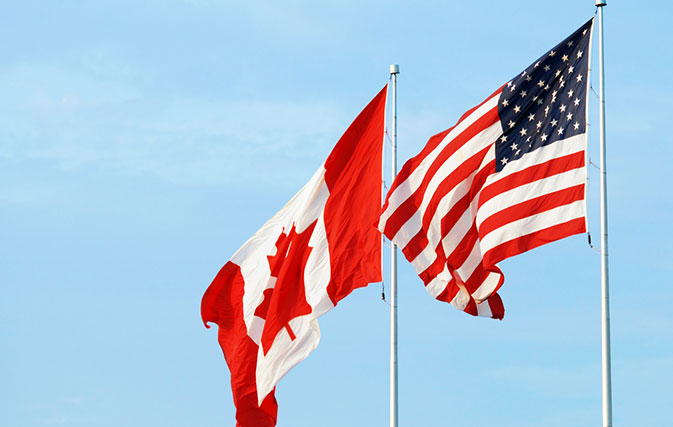TORONTO — Ever since the United States announced on Sept. 20 that it will reopen its border to fully vaccinated air travellers come November, questions have been circulating as to how the relaxed measures will impact Canadians specifically.
Will Canadians, who have been able to fly into the U.S. throughout the pandemic, need to start showing proof of vaccination? Will COVID-19 testing be required too? And will the U.S. side of the land border, closed since March 2020, finally reopen?
To help clear up any confusion, Travelweek reached out to Brand USA, the organization tasked with marketing the United States as a travel destination. Here’s what we know for sure:
- On March 21, 2020, the governments of the United States, Mexico and Canada temporarily restricted non-essential travel across the U.S.-Canada and U.S.-Mexico land borders. These restrictions have been rolled forward on a monthly basis and are scheduled to remain in effect for the land border into the U.S. through Oct. 21, 2021.
- Since Jan. 26, 2021, all air passengers entering the United States, including U.S. citizens and Legal Permanent Residents, have been required to present a negative COVID-19 test taken within three calendar days of departure, or proof of recovery from the virus within the last 90 days.
- There are currently no restrictions in place for Canadians entering the United States via air unless they have been physically present, in the 14 days prior to entry, within one of the countries subject to restrictions and do not qualify for an exemption. These countries include those in the European Schengen area, the United Kingdom, Ireland, China, India, Brazil, South Africa and Iran.
- The new rules that come into effect in November will require all international visitors, including Canadians, to provide proof of vaccination and a negative COVID-19 test result taken within three days of their flight, plus additional passenger contact information.
- The new system will replace the current one that restricts travel on a broad basis, according to physical presence in restricted countries.
Of course, one of the biggest question marks surrounding the new rules pertain to mixed doses of COVID-19, and whether travellers who’ve received a mixed dose regimen will be allowed entry into the United States starting in November. According to the U.S. Centers for Disease Control (CDC), COVID-19 vaccine products are not interchangeable, citing limited data on the safety and efficacy of a mixed-product series. However, mixed doses of the two mRNA vaccines – Pfizer and Moderna – are acceptable, but only in “exceptional situations,” for example, when an mRNA vaccine administered for the first dose cannot be determined or is no longer available for the second dose.
So where does that leave the 3.9 million Canadians who have received mixed doses of vaccines, whether a combination of the two mRNA vaccines or one with AstraZeneca?
“Further operational details will be developed by the federal government in the weeks ahead, and we expect this will include information about accepted vaccines, as well as other information Canadian travellers will need to prepare for and safely enjoy their next visit to the United States,” says Aaron Wodin-Schwartz, Senior Vice President, Public Affairs at Brand USA.
Wodin-Schwartz, who says that the organization is “thrilled” by the news of the reopening of international travel to the USA for vaccinated travellers, adds that Brand USA is also closely tracking developments along the U.S. land borders, “as these points of entry are important to a great number of our visitors from Canada and Mexico.”
Canada reopened its side of the border on Aug. 9, permitting fully vaccinated American travellers to enter the country, including for discretionary travel. It was widely believed that the U.S. would reciprocate, however, just two days after Canada announced the reopening, the United States said that it would be extending the closure of its side of the border for another month. It has since been extended again until Oct. 21, 2021.
The U.S. Travel Association has been vocal in its support of the border’s reopening. In August, Executive Vice President of Public Affairs and Policy Tori Emerson Barnes said that “for each month the status quo continues at the Canadian border, America’s number one source market of inbound arrivals, the United States loses US$1.5 billion in potential travel exports, leaving countless American businesses vulnerable.”
Wodin-Schwartz at Brand USA also stresses the importance of the Canadian market, telling Travelweek that COVID-19 continues to have a massive impact on the tourism economy, on both sides of the border. And although Brand USA is not permitted to engage in lobbying or other advocacy, Wodin-Schwartz says that the organization is staying in close contact with its partners to ensure that they are prepared when the land borders reopen to non-essential travel.
“Canadians are the largest source of inbound travel to the United States and we know they maintained their affinity for our destination over the past year and a half,” he says. “We look forward to welcoming even more Canadian travellers once the land border fully reopens and sharing the many safe, beautiful winter destinations – and warm-weather destinations – that the United States has to offer.”
To read the Sept. 30 issue of Travelweek, click here.

